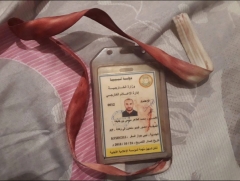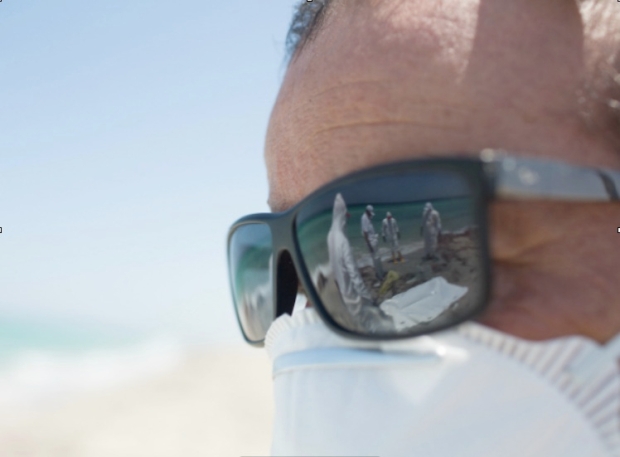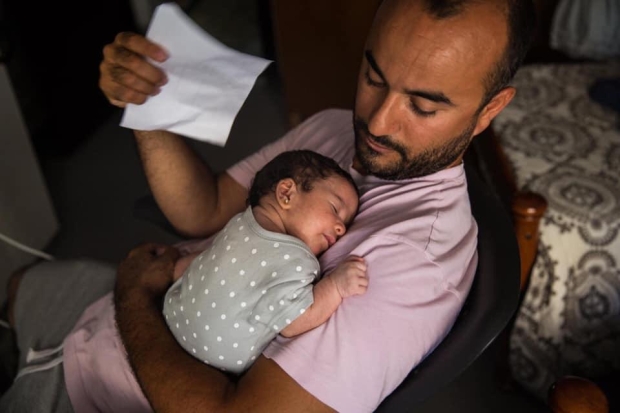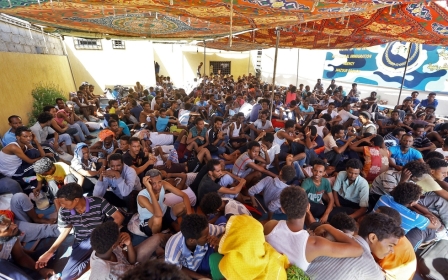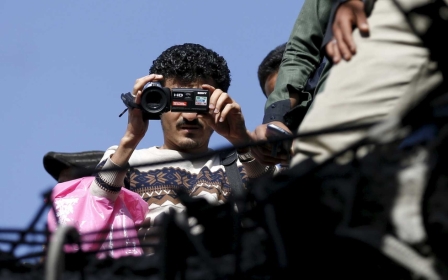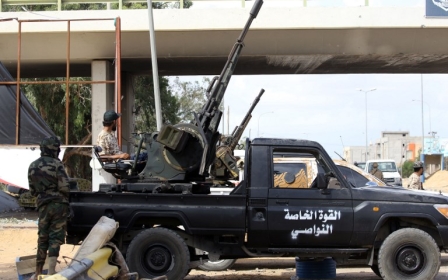Libya mourns Mohamed Ben Khalifa, photographer killed in Tripoli clashes
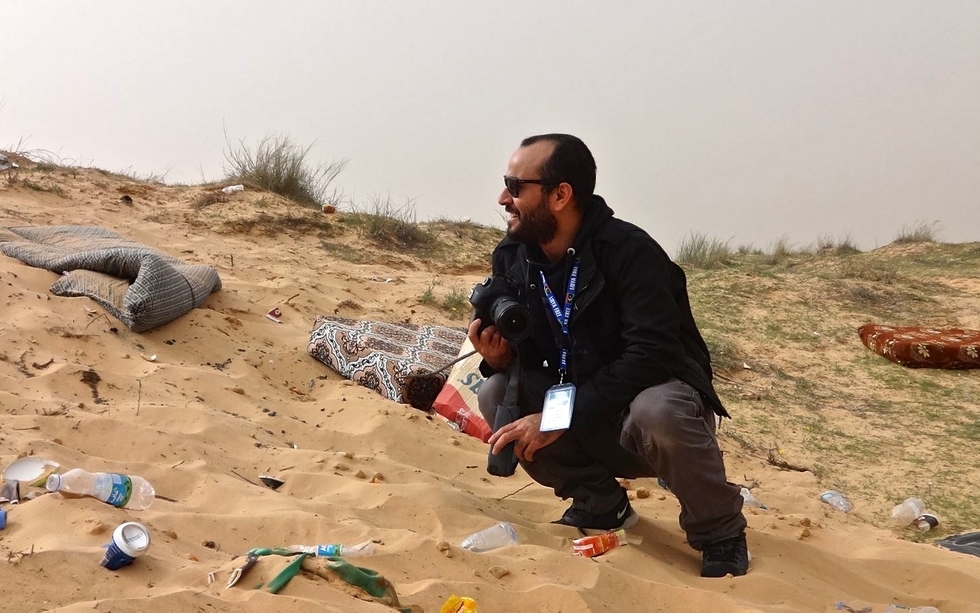
Libyan photographer and cameraman Mohamed Ben Khalifa, who mainly worked for US-based news agency the Associated Press (AP), was killed by shrapnel from a rocket while covering ongoing clashes between rival militias in the south of Tripoli on Sunday.
The 35-year-old father of one's death has struck to the very heart of Libya’s small and embattled media community, which faces daily challenges trying to work in a country that continues to be deeply suspicious of - and often unhelpful to - local and international journalists.
“Mohamed was one of the best Libyan photographers, committed to his work yet always smiling, and now he has left his place among us,” AFP photographer Hamza Turkia told Middle East Eye.
Libya and storytelling has lost a great ally in Mohamed Ben Khalifa. Although it is no consolation, Mohamed has left a great legacy, to his family and Libya, both in his character and his work, work that mattered and still matters
- Naziha Areb, Libyan-British documentary filmmaker
“Mohammed was a wonderful example of a journalist in Libya. In very difficult circumstances, he was always smiling and trying in every way to reach his goal without getting into a fight or an argument with anyone,” Reuters correspondent Ahmed Elumami told MEE. “It was simple for him, if he was told 'no', he just found a different way to work.”
A notably risk-averse journalist who approached covering conflict with caution, Mohamed had been wearing a flak jacket on Sunday, but received a severe head wound from shrapnel and died on the way to the hospital.
Last week’s fighting, the latest in a string of violent inter-militia clashes in and around the capital, left 16 civilians dead and 65 wounded.
In a country where authorities and security forces are often hostile to cameras, Mohamed faced particular problems as a photographer, but had become accustomed to finding workarounds.
“Once, when we were covering the disembarkation of a group of migrants at [Tripoli’s] Abu Seta naval base, some of the guards prevented us from taking pictures (for unknown reasons)," Elumami recalled. "But Mohammed continued calmly. He smiled, looked at me and whispered in my ear: ‘You have to know how to work, to live.’
“He said that because he was earning money working as a freelancer, which means that if there is no work, there is no wage at the end of the month.”
In a 2018 report, Reporters without Borders (RSF) said press freedom in Libya had reached a point of crisis. Since the country’s 2011 uprising, 18 journalists had been killed, 67 journalists had fled the country and eight local media outlets were operating outside of Libya, the report said, noting that in 2018 it had registered many cases of journalists’ disappearance, abduction and torture.
“The situation for journalists and media in Libya is untenable,” RSF said at the time. “The country is haemorrhaging journalists, who prefer to go into exile in order to continue reporting or choose to stop all journalistic activity because it has become too dangerous.”
Sarah Giaziri, director of the Frontline Freelance Register, which advocates for freelance journalists exposed to risk while gathering news, said: “Mohamed was passionate about his reporting and wanted his pictures to tell the world about Libya. It became so difficult to work in Libya that many local journalists gave up or left the country, but Mohamed stayed and continued to work.”
Main client AP under fire
Although technically a freelancer, Mohamed had worked for more than four years for AP, his main client. The news agency’s minimal initial reporting of his death - with the headline “Freelance journalist killed amid new round of Libya clashes“ - sparked outrage on social media, and was widely-criticised by colleagues.
With news agencies and mainstream publications increasingly resorting to minimal or intermittent presence of international reporters on the ground, especially in unstable countries such as Libya, local journalists such as Mohamed are increasingly filling the void. Although usually filing the best and most immediate material while often taking the biggest risks, local journalists often receive scant recognition, especially if injured or killed.
“The Associated Press is distraught by the death of freelance photographer Mohamed Ben Khalifa, who had contributed important, impactful photos from Libya to AP since 2014. Our thoughts are with his family, especially his wife and young daughter, and we offer our deepest condolences,” AP senior vice president and executive editor Sally Buzbee and AP vice president for international news Ian Phillips said in a statement.
“It is heartbreaking any time a journalist is killed on the job. AP works closely with its freelance and staff journalists to try to ensure their safety.”
AP did not answer MEE’s specific questions asking if they would be offering any financial support to Mohamed’s wife Lamia Jamal Abousahmen and their six month-old daughter Rayan.
“AP wrote about his death like a regular news article, as though Mohamed didn’t belong to their media. How is it possible that a person works under your name and goes into danger for your agency and you report his death in a normal news article?” Khalifa said.
“We hope that perhaps this is some sort of professionalism and they are planning to do something more but, if this is all they do, it is totally unacceptable.”
Here in Libya, it is almost impossible to be an independent journalist and live in peace without problems, but he continued, always being kind and honest in everything he did
- Fathi Khalifa, cousin
AP published an obituary for Mohamed and a retrospective of his work late Monday evening.
“Mohamed personified the role local freelance journalists play in the news gathering ecosystem. Without local journalists, we would not know what was happening on the ground in places that are hard to report from, like Libya,” said Giaziri of the Frontline Freelance Register.
“That is why it’s so vital that the international media who work with them support them, especially when they are in crisis, and acknowledge their contribution if tragically as in Mohamed’s case they are killed doing their work.”
A lifelong passion for photography
Mohamed, who studied fine arts, had a lifelong passion for photography, which flourished in the aftermath of Libya’s 2011 uprising against long-term Libyan ruler Muammar Gaddafi. “He started working as a professional photographer in 2011 but I remember him, since he was a child, being obsessed with pictures, photographs and cameras,” said his cousin Fathi Khalifa.
Mohamed, 35, contributed a huge portfolio of work - from documenting Libya’s post-2011 descent into chaos - to the coverage of Libya over the past eight years, particularly focusing on the plight of migrants.
“No other photographer had the same body of work on migration as Mohamed,” Khalifa said. His compassionate approach to photographing tragedy was reflected in his many photos of the dead migrants whose bodies frequently wash up on Libya’s shores. Although keen to report the full horror of the situation, he told fellow journalists how important he felt it was to preserve the dignity of the dead.
“In 2012 there was a wonderful group of new talent emerging out of Libya, Mohamed was one of these - eager, funny but dedicated. He went on to be one of the most prominent photojournalists in Libya which is not an easy job, especially when you are freelance, and especially in Libya's complex situation,” said Libyan-British documentary filmmaker Naziha Arebi.
“Libya and storytelling has lost a great ally in Mohamed Ben Khalifa. Although it is no consolation Mohamed has left a great legacy, to his family and Libya, both in his character and his work, work that mattered and still matters.”
Mohamed reported extensively on Libya’s unending political chaos as well as its descent into a complex series of civil conflicts, but his cousin recalled his commitment to reporting on all of Libya’s stories, no matter how small, citing endless visits to hospitals, internally displaced persons (IDP) camps, orphanages, aid distributions and even small local events.
The cousins recently spent a fortnight together in Libya’s south, where Mohamed reported on the Saharan town of Ghat’s cultural festival.
“Here in Libya, it is almost impossible to be an independent journalist and live in peace without problems, but he continued, always being kind and honest in everything he did,” Khalifa said. “His death is a great loss, not only for us as a family, but for all of Libya.”
This article is available in French on Middle East Eye French edition.
Middle East Eye propose une couverture et une analyse indépendantes et incomparables du Moyen-Orient, de l’Afrique du Nord et d’autres régions du monde. Pour en savoir plus sur la reprise de ce contenu et les frais qui s’appliquent, veuillez remplir ce formulaire [en anglais]. Pour en savoir plus sur MEE, cliquez ici [en anglais].


